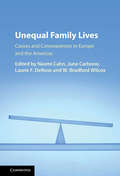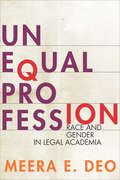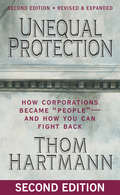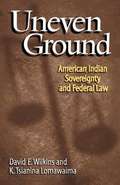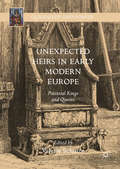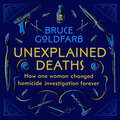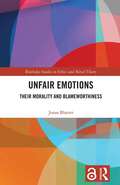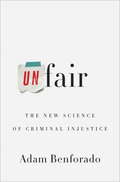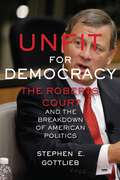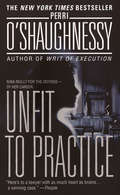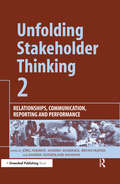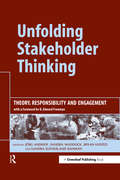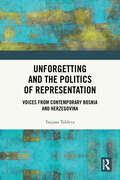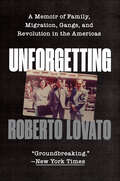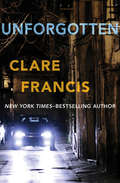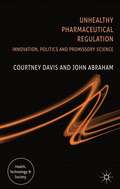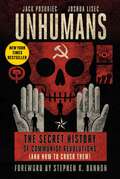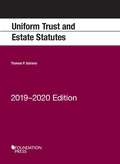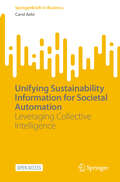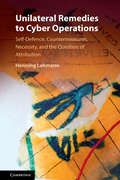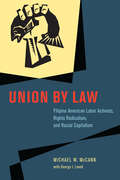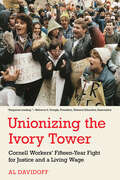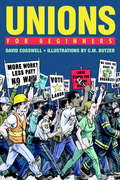- Table View
- List View
Unequal Family Lives: Causes and Consequences in Europe and the Americas
by June Carbone Naomi Cahn W. Bradford Wilcox Laurie F. DeRoseAcross the Americas and Europe, the family has changed and marriage is in retreat. To answer the question of what's driving these changes and how they impact social and economic inequality, progressives have typically focused on the economic causes of changing family structures, whereas conservatives tend to stress cultural and policy roots. In this illuminating book, an international group of scholars revisit these issues, offering competing and contrasting perspectives from left, center, and right, while also adding a third layer of analysis: namely, the role of gender - changes in women's roles, male employment patterns, and gendered family responsibilities - in driving family change across three continents. Unequal Family Lives: Causes and Consequences in Europe and the Americas adds richness and depth to our understanding of the relationship between family and economics in the United States, Europe, and Latin America. This title is also available as Open Access.
Unequal Profession: Race and Gender in Legal Academia
by Meera E. DeoThis book is the first formal, empirical investigation into the law faculty experience using a distinctly intersectional lens, examining both the personal and professional lives of law faculty members. Comparing the professional and personal experiences of women of color professors with white women, white men, and men of color faculty from assistant professor through dean emeritus, Unequal Profession explores how the race and gender of individual legal academics affects not only their individual and collective experience, but also legal education as a whole. Drawing on quantitative and qualitative empirical data, Meera E. Deo reveals how race and gender intersect to create profound implications for women of color law faculty members, presenting unique challenges as well as opportunities to improve educational and professional outcomes in legal education. Deo shares the powerful stories of law faculty who find themselves confronting intersectional discrimination and implicit bias in the form of silencing, mansplaining, and the presumption of incompetence, to name a few. Through hiring, teaching, colleague interaction, and tenure and promotion, Deo brings the experiences of diverse faculty to life and proposes a number of mechanisms to increase diversity within legal academia and to improve the experience of all faculty members.
Unequal Protection: How Corporations Became ""People"" -- and How You Can Fight Back
by Thom HartmannNEW EDITION, REVISED AND UPDATED Unequal taxes, unequal accountability for crime, unequal influence, unequal control of the media, unequal access to natural resources—corporations have gained these privileges and more by exploiting their legal status as persons. How did something so illogical and unjust become the law of the land? Americans have been struggling with the role of corporations since before the birth of the republic. As Thom Hartmann shows, the Boston Tea Party was actually a protest against the British East India Company—the first modern corporation. Unequal Protection tells the astonishing story of how, after decades of sensible limits on corporate power, an offhand, off-the-record comment by a Supreme Court justice led to the Fourteenth Amendment—originally passed to grant basic rights to freed slaves—becoming the justification for granting corporations the same rights as human beings. And Hartmann proposes specific legal remedies that will finally put an end to the bizarre farce of corporate personhood. This new edition has been thoroughly updated and features Hartmann’s analysis of two recent Supreme Court cases, including Citizens United v. Federal Election Commission, which tossed out corporate campaign finance limits.
Unequal Protection: The Rise of Corporate Dominance and the Theft of Human Rights
by Thom HartmannFrom the book cover: Unequal taxes, unequal accountability for crime, unequal influence, unequal privacy, and unequal access to natural resources-these and other inequalities are the effects of corporations winning the rights of persons while simultaneously having the legal protections to avoid the responsibilities that come with these rights. The largest transnational corporations fill a role that has historically been filled by kings. They control most of the world's wealth and exert power over the lives of most of the world's citizens. Their CEOs are unapproachable and live lives of nearly unimaginable wealth and luxury. This new feudalism was not what our founders envisioned for America. Thom Hartmann tells the startling and intriguing story that will forever change our understanding of American history and how to get back to a government of, by, and for the people. He proposes specific legal remedies that could truly save the world from political, economic, and ecological disaster.
Uneven Ground: American Indian Sovereignty and Federal Law
by David Wilkins K. Tsianina LomawaimaIn the early 1970s, the federal government began recognizing self-determination for American Indian nations. As sovereign entities, Indian nations have been able to establish policies concerning health care, education, religious freedom, law enforcement, gaming, and taxation. Yet these gains have not gone unchallenged. Starting in the late 1980s, states have tried to regulate and profit from casino gambling on Indian lands. Treaty rights to hunt, fish, and gather remain hotly contested, and traditional religious practices have been denied protection. Tribal courts struggle with state and federal courts for jurisdiction. David E. Wilkins and K. Tsianina Lomawaima discuss how the political rights and sovereign status of Indian nations have variously been respected, ignored, terminated, and unilaterally modified by federal lawmakers as a result of the ambivalent political and legal status of tribes under U.S. law.
Uneven Justice: The Plot to Sink Galleon
by Raj RajaratnamThe inside story of a case that illustrates the horrific perils of unchecked prosecutorial overreach, written by the man who experienced it firsthand.Raj Rajaratnam, the respected founder of the iconic hedge fund Galleon Group, which managed $7 billion and employed 180 people in its heyday, chose to go to trial rather than concede to a false narrative concocted by ambitious prosecutors looking for a scapegoat for the 2008 financial crisis. Naively perhaps, Rajaratnam had expected to get a fair hearing in court. As an immigrant who had achieved tremendous success in his adopted country, he trusted the system. He had not anticipated prosecutorial overreach—inspired by political ambition—FBI fabrications, judicial compliance, and lies told under oath by cooperating witnesses. In the end, Rajaratnam was convicted and sentenced to eleven years in prison. He served seven and a half. Meanwhile, not a single senior bank executive responsible for the financial crisis was even charged. Uneven Justice is the story of his bewildering and confounding prosecution by forces who, quite frankly, were looking for bigger game. When Rajaratnam refused to support the narrative that would make that happen, he and the Galleon Group became collateral damage. A cautionary tale with implications for us all, Uneven Justice is both a riveting page-turner and an eye-opening lesson in the vagaries of justice when an unscrupulous prosecutor is calling the shots.
Unexpected Heirs in Early Modern Europe
by Valerie SchutteThere were many surprising accessions in the early modern period, including Mary I of England, Henry III of France, Anne Stuart, and others, but this is the first book dedicated solely to evaluating their lives and the repercussions of their reigns. By comparing a variety of such unexpected heirs, this engaging history offers a richer portrait of early modern monarchy. It shows that the need for heirs and the acquisition and preparation of heirs had a critical impact on sixteenth- and seventeenth-century culture and politics, from the appropriation of culture to the influence of language, to trade and political alliances. It also shows that securing a dynasty relied on more than just political agreements and giving birth to legitimate sons, examining how relationships between women could and did forge alliances and dynastic continuities.
Unexplained Deaths: How one woman changed homicide investigation forever
by Bruce GoldfarbFor most of human history, sudden and unexpected deaths of a suspicious nature, when they were investigated at all, were examined by lay persons without any formal training. People often got away with murder. Modern forensic investigation originates with Frances Glessner Lee - a pivotal figure in police science.'Disturbing dioramas created by an American millionairess revolutionised the art of modern forensics.' DAILY TELEGRAPH Frances Glessner Lee (1878-1962), born a socialite to a wealthy and influential Chicago family, was never meant to have a career, let alone one steeped in death and depravity. Yet she became the mother of modern forensics and was instrumental in elevating homicide investigation to a scientific discipline.Frances Glessner Lee learned forensic science under the tutelage of pioneering medical examiner Magrath - he told her about his cases, gave her access to the autopsy room to observe post-mortems and taught her about poisons and patterns of injury. A voracious reader too, Lee acquired and read books on criminology and forensic science - eventually establishing the largest library of legal medicine. Lee went on to create The Nutshell Studies of Unexplained Death - a series of dollhouse-sized crime scene dioramas depicting the facts of actual cases in exquisitely detailed miniature - and perhaps the thing she is most famous for. Celebrated by artists, miniaturists and scientists, the Nutshell Studies are a singularly unusual collection. They were first used as a teaching tool in homicide seminars at Harvard Medical School in the 1930s, and then in 1945 the homicide seminar for police detectives that is the longest-running and still the highest-regarded training of its kind in America. Both of which were established by the pioneering Lee.In Unexplained Deaths, Bruce Goldfarb weaves Lee's remarkable story with the advances in forensics made in her lifetime to tell the tale of the birth of modern forensics.This audiobook was originally published in 2020 under the title 18 Tiny Deaths. (p) 2020 Octopus Publishing Group
Unfair Emotions: Their Morality and Blameworthiness (Routledge Studies in Ethics and Moral Theory)
by Jonas BlatterThis book provides a novel philosophical account of the unfairness of certain emotions. It explains how the concept of unfairness can be applied to emotions and how emotions can be the proper objects of second-person moral evaluation.Emotions are an integral part of our moral practices. While the links between emotions and morality have received much philosophical attention recently, the phenomenon of unfair emotions remains under-explored. This book examines an everyday phenomenon that we often perceive other people’s emotions as unfair, in a similar way as if they acted unfairly. It argues that the notion of unfairness combines elements of the unfittingness and of the moral relevance of an emotion. In the first half of the book, the author shows how an unfair emotion can wrong another person. His account holds that an emotion is unfair to its target if its inherent action tendencies constitute a directed moral hazard to the targeted person. In the second half, the author examines to what extent we are responsible for feeling an unfair emotion, and in what way we can – and cannot – be held accountable for it. He argues not only that emotions can be unfair but also that there are limits to when we may hold people accountable for them.Unfair Emotions will appeal to scholars and graduate students working in ethics, philosophy of emotion, moral psychology, and cognitive psychology.
Unfair: The New Science of Criminal Injustice
by Adam Benforado"A law professor sounds an explosive alarm on the hidden unfairness of our legal system." --Kirkus Reviews, starred A child is gunned down by a police officer; an investigator ignores critical clues in a case; an innocent man confesses to a crime he did not commit; a jury acquits a killer. The evidence is all around us: Our system of justice is fundamentally broken. But it's not for the reasons we tend to think, as law professor Adam Benforado argues in this eye-opening, galvanizing book. Even if the system operated exactly as it was designed to, we would still end up with wrongful convictions, trampled rights, and unequal treatment. This is because the roots of injustice lie not inside the dark hearts of racist police officers or dishonest prosecutors, but within the minds of each and every one of us. This is difficult to accept. Our nation is founded on the idea that the law is impartial, that legal cases are won or lost on the basis of evidence, careful reasoning and nuanced argument. But they may, in fact, turn on the camera angle of a defendant's taped confession, the number of photos in a mug shot book, or a simple word choice during a cross-examination. In Unfair, Benforado shines a light on this troubling new field of research, showing, for example, that people with certain facial features receive longer sentences and that judges are far more likely to grant parole first thing in the morning. Over the last two decades, psychologists and neuroscientists have uncovered many cognitive forces that operate beyond our conscious awareness. Until we address these hidden biases head-on, Benforado argues, the social inequality we see now will only widen, as powerful players and institutions find ways to exploit the weaknesses of our legal system. Weaving together historical examples, scientific studies, and compelling court cases--from the border collie put on trial in Kentucky to the five teenagers who falsely confessed in the Central Park Jogger case--Benforado shows how our judicial processes fail to uphold our values and protect society's weakest members. With clarity and passion, he lays out the scope of the legal system's dysfunction and proposes a wealth of practical reforms that could prevent injustice and help us achieve true fairness and equality before the law.From the Hardcover edition.
Unfit for Democracy: The Roberts Court and the Breakdown of American Politics
by Stephen E GottliebAsked if the country was governed by a republic or a monarchy, Benjamin Franklin replied, “A republic, if you can keep it.”Since its founding, Americans have worked hard to nurture and protect their hard-won democracy. And yet few consider the role of constitutional law in America’s survival. In Unfit for Democracy, Stephen Gottlieb argues that constitutional law without a focus on the future of democratic government is incoherent—illogical and contradictory. Approaching the decisions of the Roberts Court from political science, historical, comparative, and legal perspectives, Gottlieb highlights the dangers the court presents by neglecting to interpret the law with an eye towards preserving democracy.A senior scholar of constitutional law, Gottlieb brings a pioneering will to his theoretical and comparative criticism of the Roberts Court. The Roberts Court decisions are not examined in a vacuum but instead viewed in light of constitutional politics in India, South Africa, emerging Eastern European nations, and others. While constitutional decisions abroad have contributed to both the breakdown and strengthening of democratic politics, decisions in the Roberts Court have aggravated the potential destabilizing factors in democratic governments. Ultimately, Unfit for Democracy calls for an interpretation of the Constitution that takes the future of democracy seriously. Gottlieb warns that the Roberts Court’s decisions have hurt ordinary Americans economically, politically, and in the criminal process. They have damaged the historic American melting pot, increased the risk of anti-democratic paramilitaries, and clouded the democratic future.
Unfit to Practice: A Novel (Nina Reilly #8)
by Perri O'ShaughnessyIt's the moment every attorney fears most...one careless moment that threatens careers, reputations, lives. For Nina Reilly, it will change everything--and ignite a case where her own clients are witnesses against her...and where the defendant is Nina herself.As an attorney championing desperate people, Nina Reilly has skirted the edges of legal ethics in pursuit of a just result, but she has never before broken the rule of absolute protection of her clients' secrets. One September night in Lake Tahoe when her unlocked truck is stolen, her life changes forever. Gone are her most sensitive case files, complete with the sometimes brutally candid notes she took while interviewing her clients. It's every attorney's nightmare. And now the worst has happened: The secrets are being revealed, one by one, in ways that will cause the greatest harm. Nina's own clients complain to the State Bar of California, and suddenly Nina is fighting for her license and her livelihood in a legal proceeding that may ultimately lead her to disbarment. In desperation, Nina turns to her ex-husband, celebrated San Francisco lawyer Jack McIntyre, to represent her. And as personal tensions erupt between McIntyre and Nina's sometime boyfriend, private investigator Paul van Wagoner...as reputations are ruined and people begin to die...a chilling pattern of rage and revenge comes into focus. Someone is bent on destroying the lives of Nina's clients and, in the process, Nina Reilly.From the Hardcover edition.
Unfolding Stakeholder Thinking 2: Relationships, Communication, Reporting and Performance
by Sandra Waddock Jörg Andriof Bryan Husted Sandra Sutherland RahmanThis book is the companion to "Unfolding Stakeholder Thinking: Theory, Responsibility and Engagement", which examined many emerging theoretical and normative issues and was released to acclaim in October 2002. "Unfolding Stakeholder Thinking 2" collects a series of essays by leading researchers worldwide to focus on the practice of stakeholder engagement in terms of relationship management, communication, reporting and performance. As stakeholder relationships and business in society have become increasingly central to the unfolding of stakeholder thinking, important new topics have begun to take centre stage in both the worlds of practice and academia. The first part of the book makes clear that simply engaging with stakeholders is insufficient to build successful stakeholder strategies. Companies, considered as the focal entity in a relationship, also need to actively communicate with stakeholders and manage their relationships. Dialogue is essential but can only be useful if companies listen to the messages that stakeholders are sending them. It is also essential to understand the role of power and influence in stakeholder engagement strategies especially if partnerships or collaborations emerge from the relationships that are engendered. The book examines a wide range of corporate–NGO collaborations to determine what makes them effective – and what makes them fail. Conflict management in stakeholder alliances is also discussed. The second part of the book addresses the critically important element of emerging schemes for the assessment, measurement and reporting of business in society and relationships involving stakeholders. A variety of current approaches to stakeholder assessment and reporting are discussed here including social auditing and sustainability reporting. The evolution of stakeholder thinking has led to a new view of the firm as an organism embedded in a complex web of relationships with other organisms. The role of management becomes immensely more challenging, when stakeholders are no longer seen as simply the objects of managerial action but rather as subjects with their own objectives and purposes. This book captures the complexity of managing relationships with stakeholders and will provide both practitioners and researchers with a wealth of information on the benefits and consequences of this practice.
Unfolding Stakeholder Thinking: Theory, Responsibility and Engagement
by Sandra Waddock Jörg Andriof Bryan Husted Sandra Sutherland RahmanThis book – the first of a two-volume series – argues that, today, stakeholder thinking has evolved into the study of interactive, mutually engaged and responsive relationships that establish the very context of doing modern business, and create the groundwork for transparency and accountability. This book makes it clear that in today's societies successful companies are those that recognize that they have responsibilities to a range of stakeholders that go beyond mere compliance with the law or meeting the fiduciary responsibility inherent in maximizing returns to shareholders. If in the past the focus was on enhancing shareholder value, now it is on engaging stakeholders for long-term value creation. The process of engagement creates a dynamic context of interaction, mutual respect, dialogue and change – not a one-sided "management" of stakeholders. Indeed, the authors believe the very term "stakeholder management" to be outdated and corporate-centric. Companies can manage their relationships with stakeholders, but frequently cannot actually manage the stakeholders themselves, because, as the activist and collaborative initiatives described in this volume suggest, company-stakeholder relationships are not one-way streets and different institutions bring different agendas, goals and priorities to the engagement. There are clear implications to the way in which stakeholder thinking is unfolding today. If in the past corporate "social" responsibility was simply seen as profitability plus compliance plus philanthropy, now responsible corporate citizenship – or corporate responsibility – means companies being more aware of and understanding the societies in which they operate. Corporate responsibility means recognising that day-to-day operating practices affect stakeholders and that it is in those impacts where responsibility lies, not merely in efforts to "do good". Companies are now faced with a wide array of challenges that mean that senior executives and managers need to be able to deal with issues including greater accountability, human rights abuses, sustainability strategies, corporate governance codes, workplace ethics, stakeholder consultation and management. Stakeholder thinking needs to capture these new realities. The global reach of multinational corporations has served to highlight the need for the (re)integration of business into society, relationships into stakeholder relations, and ethics into managerial practice. The rise in power of global activism involving NGOs, and global business involving multinational corporations, makes it even more critical today for companies to consider the power and interests of corporate stakeholders when developing strategic plans. The interactivity and mutuality of relationships described in this book make it clear that firms and stakeholders share the power and responsibility to influence both the profit potential of the firm and how the benefits of the firm's success impact on society. This important volume brings together leading academic thought on stakeholder thinking for the first time. Unfolding Stakeholder Thinking will be indispensable to corporate managers, NGOs and academics seeking greater understanding of the dynamics of stakeholder thinking in a world of rapidly changing responsibilities.A companion volume, Unfolding Stakeholder Thinking 2, focusing on practical issues such as relationship management, communication, reporting, and performance, is also available.
Unforgetting and the Politics of Representation: Voices from Contemporary Bosnia and Herzegovina
by Tatjana TakševaBased on interviews and conversations in the Bosnian Federation with women survivors of war rape, children born of rape and armed conflict, leaders of NGOs who work with survivors, and people who lived through the war and who experienced it in different ways, this book challenges one dimensional representations of the Yugoslav war and subsequent peacebuilding processes. Relying on feminist ethnography and autoethnography, this volume offers systematic engagement with the politics of representation of Bosnia and survivors of war in post-war journalism and scholarship.Through rich and varied individual experiences of wartime violence and recovery that go beyond simple ‘us’ versus ‘them’ narratives of ethnic identity and intolerance, the book shows how public and private, individual and collective discourses actively shape one another and contribute to complex forms of engagement in recovery, healing and rebuilding. The author draws upon archival material to undermine the fetishization of ethnicity as a determining category that often underpins journalistic and scholarly accounts of post-war Bosnia. By retracing and repairing separations between individual and collective remembrance, and by complicating linear and monolithic conception of this process, the narratives in the book actively contest reductionist and instrumentalist accounts of the civil war in Bosnia.The book will appeal to scholars across the social sciences with interest in memory, peacebuilding, national identity, gendered violence and processes of reconciliation
Unforgetting: A Memoir of Family, Migration, Gangs, and Revolution in the Americas
by Roberto LovatoAn LA Times Best Book of the Year • A New York Times Editors' Pick • A Newsweek 25 Best Fall Books • A The Millions Most Anticipated Book of the Year"Gripping and beautiful. With the artistry of a poet and the intensity of a revolutionary, Lovato untangles the tightly knit skein of love and terror that connects El Salvador and the United States." —Barbara Ehrenreich, author of Natural Causes and Nickel and DimedAn urgent, no-holds-barred tale of gang life, guerrilla warfare, intergenerational trauma, and interconnected violence between the United States and El Salvador, Roberto Lovato’s memoir excavates family history and reveals the intimate stories beneath headlines about gang violence and mass Central American migration, one of the most important, yet least-understood humanitarian crises of our time—and one in which the perspectives of Central Americans in the United States have been silenced and forgotten. The child of Salvadoran immigrants, Roberto Lovato grew up in 1970s and 80s San Francisco as MS-13 and other notorious Salvadoran gangs were forming in California. In his teens, he lost friends to the escalating violence, and survived acts of brutality himself. He eventually traded the violence of the streets for human rights advocacy in wartime El Salvador where he joined the guerilla movement against the U.S.-backed, fascist military government responsible for some of the most barbaric massacres and crimes against humanity in recent history. Roberto returned from war-torn El Salvador to find the United States on the verge of unprecedented crises of its own. There, he channeled his own pain into activism and journalism, focusing his attention on how trauma affects individual lives and societies, and began the difficult journey of confronting the roots of his own trauma. As a child, Roberto endured a tumultuous relationship with his father Ramón. Raised in extreme poverty in the countryside of El Salvador during one of the most violent periods of its history, Ramón learned to survive by straddling intersecting underworlds of family secrets, traumatic silences, and dealing in black-market goods and guns. The repression of the violence in his life took its toll, however. Ramón was plagued with silences and fits of anger that had a profound impact on his youngest son, and which Roberto attributes as a source of constant reckoning with the violence and rebellion in his own life.In Unforgetting, Roberto interweaves his father’s complicated history and his own with first-hand reportage on gang life, state violence, and the heart of the immigration crisis in both El Salvador and the United States. In doing so he makes the political personal, revealing the cyclical ways violence operates in our homes and our societies, as well as the ways hope and tenderness can rise up out of the darkness if we are courageous enough to unforget.
Unforgotten: Betrayal, Keep Me Close, And Unforgotten (The\unremembered Ser. #2)
by Clare FrancisA courtroom drama of deceit and family secrets set in the heart of London from international bestselling author Clare Francis Lawyer Hugh Gwynne is in the throes of his most difficult court case yet: His client Tom Deacon was in a car accident in which he witnessed the death of his young daughter . . . Since the crash, Deacon claims to be suffering from trauma and flashbacks, and the case seems poised for victory as a result of Deacon's PTSD. But when an anonymous letter arrives for Gwynne, the case takes an unexpected turn that will force the lawyer to make his most difficult decision yet. Thus far, Gwynne has had what he considers a noble and idyllic life, replete with a golden wife and two adopted children. In one night, could everything come crashing down?
Unhealthy Pharmaceutical Regulation
by Courtney Davis John AbrahamEuropean and American drug regulators govern a multi-billion-dollar pharmaceutical industry selling its products on the world's two largest medicines markets. This is the first book to investigate how effectively American and supranational EU governments have regulated innovative pharmaceuticals regarding public health during the neo-liberal era of the last 30 years. Drawing on years of fieldwork, the authors demonstrate that pharmaceutical regulation and innovation have been misdirected by commercial interests and misconceived ideologies, which induced a deregulatory political culture contrary to health interests. They dismantle the myth that pharmaceutical innovations necessarily equate with therapeutic advances and explain how it has been perpetuated in the interests of industry by corporate bias within the regulatory state, unwarranted expectations of promissory science, and the emergent patient-industry complex. Endemic across both continents, the misadventures of pharmaceutical deregulation are shown to span many therapeutic areas, including cancer, diabetes and irritable bowel syndrome. The authors propose political changes needed to redirect pharmaceutical regulation in the interests of health.
Unhumans: The Secret History of Communist Revolutions (and How to Crush Them)
by Jack Posobiec Joshua LisecUSA TODAY and PUBLISHERS WEEKLY NATIONAL BESTSELLER If you don&’t understand communist revolutions, you aren&’t ready for what&’s coming. The old rules are over. The old order is over. Accusations are evidence. Activism means bigotry and hate. Criminals are allowed to roam free. Citizens are locked up. An appetite for vengeance is unleashed—to deplatform, debank, destroy. This is the daily news, yet none of it&’s new. Patterns from the past make sense of our present. They also foretell a terrifying future we might be condemned to endure. For nearly 250 years, far-left uprisings have followed the same battle plans—from the first call for change to last innocent executed, from denial a revolution is even happening to declaration of the new order. Unhumans takes readers on a shocking, sweeping, and succinct journey through history to share the untold stories of radical takeovers that textbooks don&’t teach. And there is one conclusion: We're in a new revolution right now. But this is not a book about ideology or politics. Unhumans reveals that communism, socialism, Marxism, and all other radical-isms are not philosophies but tactics—tactics that are specifically designed to unleash terror on everyday people and revoke their human rights to life, liberty, and property. These are the forces of unhumanity. This is what they do. Every. Single. Time. Unhumans steals their playbook, breaks apart their strategies piece by piece, and lays out the tactics of what it takes to fight back—and win, using real-world examples. Unhumans is an essential read for every concerned citizen both in the US and worldwide. We must stop what is coming.
Uniform Trust and Estate Statutes (Selected Statutes)
by Thomas P. GallanisThis statutory supplement is ideal for use in basic and advanced courses in trusts and estates and for practitioner reference. The 2019-2020 edition includes the updated text and official comments of the Uniform Probate Code, Uniform Trust Code, and more than a dozen other acts relating to the field of trusts and estates, including the Uniform Fiduciary Income and Principal Act (and its predecessor Uniform Principal and Income Act), Uniform Parentage Act 2017, Uniform Directed Trust Act, Uniform Trust Decanting Act, Revised Uniform Fiduciary Access to Digital Assets Act, Uniform Powers of Appointment Act, Uniform Principal and Income Act, Uniform Prudent Investor Act, Uniform Custodial Trust Act, Revised Uniform Anatomical Gift Act, Uniform Prudent Management of Institutional Funds Act, Uniform Premarital and Marital Agreements Act, Uniform Health-Care Decisions Act, Uniform Simultaneous Death Act, Uniform Transfers to Minors Act, Model Marital Property Act, Model Protection of Charitable Assets Act, and the amendments to the Uniform Fraudulent Transfer Act which is now renamed the Uniform Voidable Transactions Act. The book includes relevant provisions of the Restatement Third of Trusts and Restatement Third of Property, as well as selected prior versions of sections of the Uniform Probate Code. The book is ideal for teaching basic and advanced courses in trusts and estates. It is also ideal for practitioner reference.
Unifying Sustainability Information for Societal Automation: Leveraging Collective Intelligence (SpringerBriefs in Business)
by Carol AebiThis open access book offers a structured approach that aligns indicators of social value and provides a stable foundation amidst the dynamic and ever-changing social complexities. From detailed system scales of participation to an overview of how it works, this book presents a roadmap for automating data in systemic alignment with social value. With its adaptability to changing societal structures, it provides a pragmatic solution within existing systems while paving the way for future advancements. It is valuable for researchers and business leaders.
Unilateral Remedies to Cyber Operations: Self-Defence, Countermeasures, Necessity, and the Question of Attribution
by Henning LahmannAddressing both scholars of international law and political science as well as decision makers involved in cybersecurity policy, the book tackles the most important and intricate legal issues that a state faces when considering a reaction to a malicious cyber operation conducted by an adversarial state. While often invoked in political debates and widely analysed in international legal scholarship, self-defence and countermeasures will often remain unavailable to states in situations of cyber emergency due to the pervasive problem of reliable and timely attribution of cyber operations to state actors. Analysing the legal questions surrounding attribution in detail, the book presents the necessity defence as an evidently available alternative. However, the shortcomings of the doctrine as based in customary international law that render it problematic as a remedy for states are examined in-depth. In light of this, the book concludes by outlining a special emergency regime for cyberspace.
Union by Law: Filipino American Labor Activists, Rights Radicalism, and Racial Capitalism (Chicago Series in Law and Society)
by George I. Lovell Michael W. McCannLaborers in American West Coast agricultural fields and Alaska salmon canneries. There, they found themselves confined to exploitative low-wage jobs in racially segregated workplaces as well as subjected to vigilante violence and other forms of ethnic persecution. In time, though, Filipino workers formed political organizations and affiliated with labor unions to represent their interests and to advance their struggles for class, race, and gender-based social justice. Union by Law analyzes the broader social and legal history of Filipino American workers’ rights-based struggles, culminating in the devastating landmark Supreme Court ruling, Wards Cove Packing Co. v. Atonio (1989). Organized chronologically, the book begins with the US invasion of the Philippines and the imposition of colonial rule at the dawn of the twentieth century. The narrative then follows the migration of Filipino workers to the United States, where they mobilized for many decades within and against the injustices of American racial capitalist empire that the Wards Cove majority willfully ignored in rejecting their longstanding claims. This racial innocence in turn rationalized judicial reconstruction of official civil rights law in ways that significantly increased the obstacles for all workers seeking remedies for institutionalized racism and sexism. A reclamation of a long legacy of racial capitalist domination over Filipinos and other low-wage or unpaid migrant workers, Union by Law also tells a story of noble aspirational struggles for human rights over several generations and of the many ways that law was mobilized both to enforce and to challenge race, class, and gender hierarchy at work.
Unionizing the Ivory Tower: Cornell Workers' Fifteen-Year Fight for Justice and a Living Wage
by Al DavidoffUnionizing the Ivory Tower chronicles how a thousand low-paid custodians, cooks, and gardeners succeeded in organizing a union at Cornell University. Al Davidoff, the Cornell student leader who became a custodian and the union's first president, tells the extraordinary story of these ordinary workers with passion, sensitivity, and wit.His memoir reveals how they took on the dominant power in the community, built a strong organization, and waged multiple strikes and campaigns for livable wages and their dignity. Their strategies and tactics were creative and feisty, founded on worker participation and ownership.The union's commitment to fairness, equity, and economic justice also engaged these workers—mostly rural, white, and conservative—at the intersections of racism, sexism, classism, and homophobia. Davidoff's story demonstrates how a fighting union can activate today's working class to oppose antidemocratic and white supremacist forces.
Unions For Beginners
by David CogswellIt is a time when unions have returned to the front pages of newspapers and blogs and demonstrators are in the streets of America every day. It is a time when the right wing has tried to strike the final blow against what remains of the right to collective bargaining. It is a time when millions of members of the middle class are falling through the cracks in a downward economic trend that parallels the decline of unions. It is this time when people are turning again to the history of unions. Unions For Beginners provides an introduction to that essential history. Written and profusely illustrated in the user-friendly, accessible style of the For Beginners series, Unions For Beginners lays down a simple presentation of the colorful epic story of the struggle of working people to rise from lives dominated by toil and underpaid work to becoming full-fledged participants in the American dream they helped to build. Unions For Beginners presents the history of unions and the labor movement, the principles underlying union organizing, the decline of unions in the shadow of the rising corporate state, and the resurgence in the 21st century of union activism.
